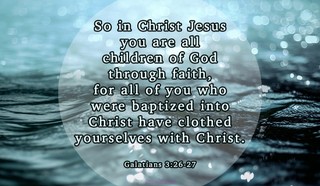
- Recent Translations
- All Translations
Galatians 3:19
Share
Settings
Images for Galatians 3:19

Galatians 3:19 Meaning and Commentary
Wherefore why then serveth the law?
&c.] If this be the case, might an objector say, why was the law given? what ends and purposes are to be served by it? of what use can it be? there had as good been no law at all, if the inheritance is not of it, and there is no justification by it. To which it is answered,
it was added because of transgressions;
four hundred and thirty years after the covenant made with Abraham; it did not succeed it, nor take the place of it, and so make it null and void; but was over and above added unto it, for the sake of restraining transgressions; which had there been no law, men would not have been accountable for them; and they would have gone into them without fear, and with impunity; but the law was given, to lay a restraint on men, by forbidding such and such things, on pain of death; and also for the detecting, discovering, and making known transgressions, what they are, their nature and consequences; these the law charges men with, sets them before them, in their true light and proper colours; and convicts them of them, stops their mouths, and pronounces them guilty before God: moreover, this law entered in, over and above any other revelation God was pleased to make, "that the offence might abound", ( Romans 5:20 ) either that particular offence, the sin of Adam, the apostle is there speaking of; the heinous nature of which, its aggravated circumstances, and the justness of its imputation to his posterity, were more clearly discerned by this law; and so the Syriac version here renders it in the singular number, (atwnyjom ljm) , "because of transgression"; or all other offences and transgressions, which are increased through the multiplicity of precepts, and attended with more aggravating circumstances, than if no law was given, and more eagerly pursued after, through the prohibition of them; such being the corrupt nature of man, that the more anything is forbidden, the more desirous it is of it: add to all this, that the law was given for the punishing of transgressions, for which it curses, and threatens with death, and inflicts it on Christless sinners: hence it is clear there can be no justification by it, and yet it is not useless and insignificant:
till the seed should come,
to whom the promise was made; either Christ the seed of the woman, and of Abraham, who was to come in the flesh, and is come; and to whom the grand promise of life, and all the promises of the covenant were made; not for himself, but for those he represented, and in whom they are all secure: until whose coming to finish transgression, and bring in everlasting righteousness, the law was to continue in the form in which, and the use for which it was added, and then to cease as the ministration of Moses; for through the coming of Christ it received its full accomplishment, and came to an end; the ceremonial law was utterly abolished, and the moral law ceased to be a covenant of works, though it continues a rule of walk and conversation; and the whole Mosaic economy was no more: or else the seed here intends the spiritual seed of Abraham; particularly among the Gentiles, to whom the promise of blessedness, of justification, and eternal life was made; and the sense be, that till such time that a generation of faithful men, of believers in Christ, should arise among the Gentiles, the law was to continue with the Jews; but when they should spring up, the middle wall of partition should be broken down, and Abraham's spiritual seed among Jews and Gentiles make up one body, one people, and be fellow heirs and partakers of the promise of God in Christ, through the Gospel:
and it was ordained by angels;
not Moses and Aaron, and Joshua, as some say; for though Moses was concerned in the giving of the law, yet not Aaron nor Joshua, nor are any of them ever called angels; but the holy elect angels are here meant, the ten thousands of saints, or holy ones, God came to Mount Sinai with, and the Lord was among, in the holy place; see ( Deuteronomy 33:2 ) ( Psalms 68:17 ) and so the Jews say F12 that the Lord appeared on Mount Sinai gloriously, (aykalmd hytyk Me) , "with companies", or "troops of angels", to give the law to his people: and this may be said to be "ordained" by them, inasmuch as it might be written and spoken by them, as the instruments and ministers God made use of; for though the tables are said to be the work of God, and the writing the writing of God, and to be written with the finger of God, and he is said to speak all the words of it, yet this hinders not, but that all this might be done by the means of angels; who might be employed in disposing and fitting the stones in the form they were, and in writing the law upon them; hence it is said to be given by the disposition of angels, ( Acts 7:53 ) and certain it is, that it was spoken by them, ( Hebrews 2:2 ) they forming in the air those articulate and audible sounds, when the law was delivered; who were also concerned in the thunderings and lightnings, and in the blowing of the trumpet, that waxed louder and louder at that time:
in the hand of a mediator;
not Christ, as many interpreters, ancient and modern, have thought; for though he was present at the giving of the law, as appears from ( Acts 7:38 ) ( Psalms 68:17 Psalms 68:18 ) and is the Mediator between God and man, and had the law in his hand, out of which it went forth as the lawgiver; and as the surety of his people has fulfilled it, and by so doing put an end to it, and delivered them from the curse and condemnation of it; yet he is the Mediator of the new and better covenant, not the ministration of death, but of life; and so Moses and Christ, the law and Gospel, the old and the new covenant, are continually opposed to each other; besides, the mediator here seems to be represented as inferior to the angels, and as receiving the law into his hands from them, by whom it was ordained; which to conceive of Christ, is very much to the demeaning and lessening of him. Moses is the mediator here meant, who stood between God and the people of Israel; not to make peace between them, but to show the word of God from him to them, and this at their own request; see ( Deuteronomy 5:5 Deuteronomy 5:23-27 ) , and in his hand the tables of the law were, when he came down from the mount, and was a typical mediator of Christ. So the Jews say of him, that
``he was (yeuma) , "a mediator" between them and God F13.''
F12 Targum in 1 Chron. xxix. 11.
F13 Tzeror Hammor, fol. 136. 1, 2.
